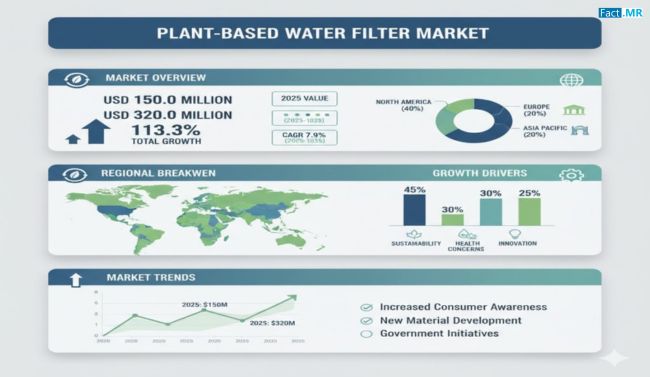As global awareness of water scarcity and pollution rises, the plant-based water filter market is gaining momentum. Plant-based water filters leverage natural materials to purify drinking water, offering an eco-friendly and sustainable alternative to conventional filtration systems. From households to commercial applications, these filters are becoming a preferred choice for individuals and organizations seeking cost-effective and environmentally responsible water purification solutions.
Market Overview:
Plant-based water filters utilize materials such as plant xylem, seeds, peels, and aquatic plants to remove impurities from water. These filters work by naturally trapping sediments, bacteria, and other contaminants without relying on chemical additives. The technology builds on traditional practices refined over generations and integrates modern innovation to deliver reliable and safe drinking water. Increasing consumer preference for green and sustainable solutions is accelerating the adoption of plant-based filtration technologies worldwide.
Regional Insights:
North America leads the market due to rising environmental awareness and proactive adoption of sustainable water solutions. Europe follows closely, supported by stringent environmental regulations and government initiatives promoting clean water access. Asia-Pacific, particularly countries like India and China, is witnessing significant growth, driven by large populations, rising water contamination concerns, and investments in eco-friendly filtration technologies. Developing regions in South America and Africa are also exploring plant-based filtration solutions to address water quality challenges in rural and semi-urban areas.
Key Trends & Forecast:
Several trends are shaping the plant-based water filter market:
- Innovative Filtration Techniques:Researchers are exploring plant xylem, jackfruit seeds, moringa seeds, banana peels, and other plant materials for efficient water purification.
- Portable Filtration Solutions:Lightweight and portable plant-based filters are gaining popularity among trekkers, outdoor enthusiasts, and households in water-scarce areas.
- Sustainability Focus:Consumers increasingly prefer natural, chemical-free filtration options that minimize environmental impact.
- Collaborative Development:Partnerships between research institutions and companies are fostering innovation in plant-based water purification technologies.
Applications & End-Use Outlook:
Plant-based water filters have wide-ranging applications:
- Residential:Households are adopting plant-based filters for safe drinking water and eco-conscious living.
- Commercial:Offices, restaurants, and hospitality sectors utilize these filters to provide clean water sustainably.
- Humanitarian and Rural Use:NGOs and government agencies implement plant-based filtration systems in developing regions to address safe drinking water challenges.
- Outdoor and Emergency Applications:Portable plant-based filters are crucial for hikers, campers, and disaster-relief efforts where conventional water treatment is unavailable.
Challenges & Market Restraints:
Despite the growth potential, the market faces certain hurdles:
- Limited Awareness:Lack of consumer knowledge regarding the effectiveness of plant-based filters can slow adoption.
- Performance Variability:Filtration efficiency depends on plant material quality and design, which can vary across regions.
- Competition from Conventional Technologies:Chemical-based and electronic water filters remain popular due to convenience and widespread availability.
- Infrastructure Limitations:In some developing regions, logistics and supply chain challenges can restrict access to these filters.
Country-Specific Insights:
- United States:Increasing environmental awareness and sustainable living trends support the adoption of plant-based water filtration solutions.
- India:Innovation hubs, such as the Tata Center for Technology and Design, are driving research into plant-based water purification technologies, addressing rural water safety challenges.
- Europe:Government policies and eco-conscious consumer preferences accelerate the adoption of plant-based filtration systems across residential and commercial sectors.
Conclusion:
The plant-based water filter market represents a growing opportunity in sustainable water purification. As demand for eco-friendly, cost-effective, and accessible filtration solutions rises, plant-based filters are set to play a critical role in providing safe drinking water globally. With continued innovation, collaboration, and awareness, the market can expand across residential, commercial, and humanitarian applications, contributing to a greener and healthier future for communities worldwide.
Browse Full Report – https://www.factmr.com/report/3323/plant-based-water-filter-market



